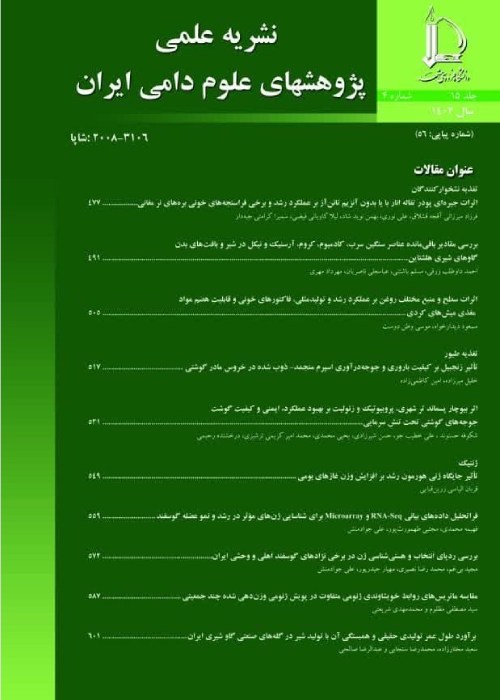Effect of Melilotus officinalis, Oliveria decumbens Vent and Aloe vera L on production performance, biochemistry characteristics and meat microbial count in Japanese quail
Development of poultry production causes increasing demand for feed ingredients and also ways of manipulating poultry diets in order to increase feed conversion ratios for maximum production. In this regard, use of feed additives and growth promoters has been increased. Antibiotic growth promoters have been successfully used at sub therapeutic doses in poultry production to promote growth and protect health of the birds. The use of antibiotics as growth promoters has been prohibited by many countries as they have different side effects on both bird and human health. There has been an increasing trend towards using natural feed additives to improve the performance, increase the dietary protein, energy utilization and to maintain health of birds. Herbs, botanicals, essential oils, oleoresins and algae are alternatives for antibiotics and which have not been found to causes antibiotic-like side effects on consumers. The beneficial effects of herbal plants additives in poultry (broilers, layers, broiler breeders, layer breeders and quail) may arise from their having positive effect on feed intake, digestive secretions, immune stimulation, antibacterial, antibacterial, coccidiostatic, antiviral or anti-inflammatory activity. In plant tissues, pH values are dependent on the presence of poly-carboxylic acids, phosphate salts, fiber and proteins. In this study, we partly replaced quail meal with very low amounts of Melilotus officinalis, Oliveria decumbens vent and Aloe Vera L meal to evaluate the medicinal plants as a Quail meal supplement and to assess the effects of this dietary change on growth performance, Biochemical factors, Qualitative agent and microbial load in Japanese quail meat.
A total of 280 Japanese Quail hatchlings (one-day-old at test inception) were used in the study. Treatment protocol used four replicates each of eight different tests either of two levels (0.5 or 2% of total food mass) of tested medicinal plant material and one control group that received a diet free of medical plant supplements. Each treatment had four replicates, thus there was a total of 28 groups of 10 birds. The hatchling birds were maintained and adapted for 15 days under lab conditions: 16-h lighting, 8 h darkness, at temperature of 25 °C ± 2. Feed (mash form) and water were provided ad libitum throughout the whole trial. Body weight gain per hen were evaluated at 27 and 42 d. Feed intake and feed conversion ratio were determined and calculated during each phase of whole period. At the end of the experimental period, 4 Quail from each replicate of different groups were randomly selected and sacrificed to calculate the carcass. Serum triglycerides (TG), cholesterol (Cho), High Density Lipoprotein (HDL) and Low Density Lipoprotein (LDL) cholesterol levels were determined. The meat samples were dried for 24h in an oven at 70 ˚C and the meat moisture was calculated. The meat samples were placed after centrifugation for 24h in an oven at 70 ˚C and the meat water holding capacity was calculated. The ash content was determined by charring followed by ashing the samples at 720°C to a white ash. The pH of the meat samples was determined by homogenizing 10 g of meat with 50 mL of distilled water. The homogenates were filtered, and the pH of each sample was measured with a pH meter at room temperature. The samples were analyzed for the total bacterial and coliforms load using plate count agar by PCA and Mac Conkey technique. The subjective evaluations of product quality were carried out by an experienced panel composed of 7 people.
The results showed that the addition of dietary supplements of M. officinalis, O. decumbens vent and A. Vera L at the level of 0.5 or 2% ratio had no significant effect on LW 27d, LW 42d and feed conversion ratio of quail. However, the highest Carcass weight was recorded in group fed with A. Vera L-2% and the least Carcass weight was recorded in group fed with M. officinalis-2%. Qualitative factors, carcass components, microbial community, biochemical factors and meat pH significantly affected by levels of herbal plants powder (p≤0.05). M. officinalis-0.5% reduced cholesterol and triglyceride. We also recorded evidence that O.decumbens-2% Vent powders reduced the total bacterial and coliforms. It was concluded that addition of 2% of A. vera to the diet can improve performance and addition of 2% of M. officinalis, O. decumbens a to the diet can improve meat shelf life in Japanese quails.
- حق عضویت دریافتی صرف حمایت از نشریات عضو و نگهداری، تکمیل و توسعه مگیران میشود.
- پرداخت حق اشتراک و دانلود مقالات اجازه بازنشر آن در سایر رسانههای چاپی و دیجیتال را به کاربر نمیدهد.


